Elixir: a practical introduction
Geovane Fedrecheski - geovane@lsi.usp.br
School of Engineering
University of São Paulo
Contents
- Functional Programming
- Elixir
- Hands-on
Functionaλ Programming
f(g(x), h(...))

Steve Vinoski, IEEE Computing Society 2009
"... ironically, the resurgence of interest in FP languages owes a lot to Java’s popularity."
"Another reason [...] is the move toward multicore architectures."
"... developers look for the opportunity to
get more done with less."
Welcome to the Functional Web
Functional Programming Languages





Lisp

Elm

Elixir

José Valim

Core committer
Unsatisfied with thread-based concurrency
~2010

Unsatisfied with thread-based concurrency

Repetitive strain
injury




by Bruce A. Tate
So what's interesting about
this Erlang thing?
What even an "Erlang" is?
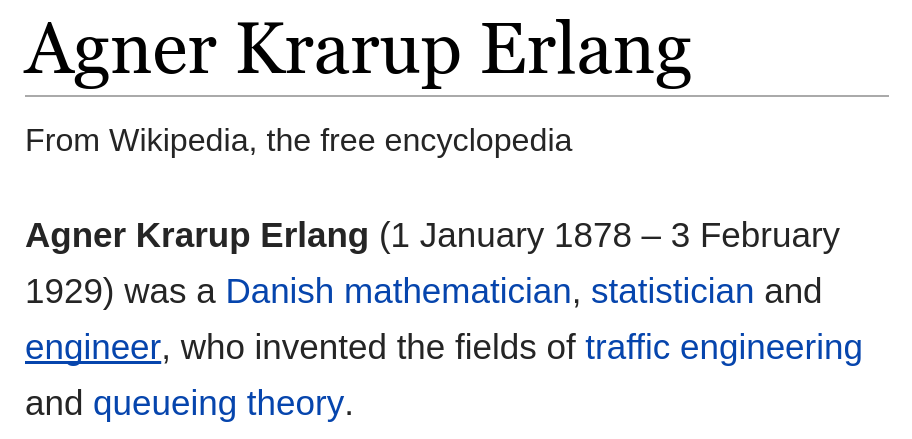

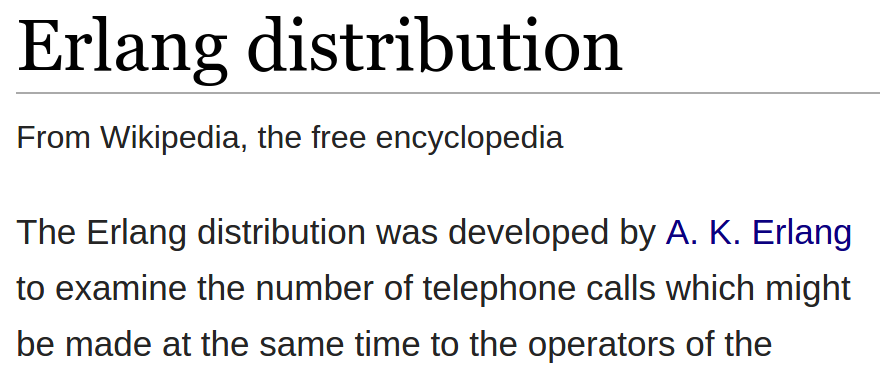

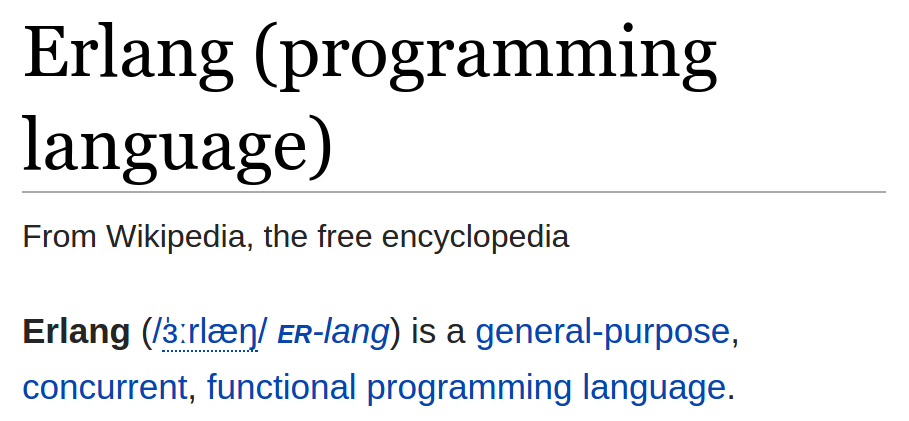

A bit of History

Erlang
context

Created in the Telecommunication industry



...

~1980

Erlang
requirements

- Concurrency
- Soft real-time
- Distribution
- Hardware Interaction
- Large Software Systems
- Complex Functionality
- Continuous Operation
- Quality Requirements
- Fault Tolerance







Programming language
Virtual Machine - BEAM
Framework - OTP
-module(fact).
-export([fac/1]).
fac(0) -> 1;
fac(N) -> N * fac(N-1).
Cases





The VM
Concurreny
Fault tolerance
Data structures
Consistent libs
Modern tooling


I loved everything that Erlang had
but I hated everything that it didn't had
- José Valim

Elixir
~2011
Elixir
Goals

-
Extensibility
-
Productivity
-
Compatibility
Elixir
Erlang
Features


Pattern Matching

> {method, path} = {:get, "temp"}
{:get, "temp"}
> method
:get
> path
"temp"
b = :binary.encode_unsigned(258)
# b has value <<1, 2>>
<<x, 2>> = b
# x has value 1
i = :binary.decode_unsigned(<<x, 2>>)
# i has value 258request = {:get, "temp"}
case request do
{:post, path, payload} ->
send_resp 200
{:get, path} ->
send_resp 200, "{'value':17.5, 'unit': 'celsius'}"
enddefmodule Math do
def fib(0), do: 0
def fib(1), do: 1
def fib(n), do: fib(n-1) + fib(n-2)
end
Math.fib(8) # => 21Anonymous Functions

> add = fn(a, b) -> a + b end
#Function<12.71889879/2 in :erl_eval.expr/5>
> add.(1, 2)
3> Enum.map([17.9, 20.2, 18.4], fn(x) -> x * 2 end)
[35.8, 40.4, 36.8]Can be passed as parameters
Processes

spawn
A lightweight thread of execution
(The key Erlang/Elixir abstraction)

How is this different from threads?
-
No shared memory
-
VM Processes
Do not share memory
Communicate via
Message Passing
message
VM Processes
Excuse me, have you ever heard of (VM) processes?

Erlang VM
Scheduler
Sched.
Sched.
Sched.
OS Processes
OS Threads
VM Processes

OS
pid = spawn(fn ->
:timer.sleep(3000)
IO.puts "hi"
end)fn ..
spawn
self()
sleep
puts
A lightweight thread of execution
Messages
pid = spawn(...)
send(pid, "hello")receive do
msg ->
IO.puts msg
endfn ..
spawn
self()
receive
send


Node.spawn(
:"app@computer-2",
fn -> Hello.world end)
send
receive
app@computer-1
app@computer-2
Distributed
Same syntax

We have:
-
Isolated Processes
-
Message passing
-
Distribution
We want:
-
Fault Tolerance

dangling processes!

spawn
spawn

call the supervisor
supervisor
worker
worker
worker

worker
Supervision Tree
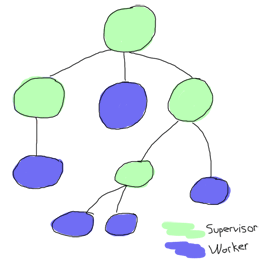
import Supervisor.Spec children = [ worker(Cache, []), supervisor(DatabaseSupervisor, []), supervisor(TCPSupervisor, [4040]) ] Supervisor.start_link(children, strategy: :one_for_one)
Applications
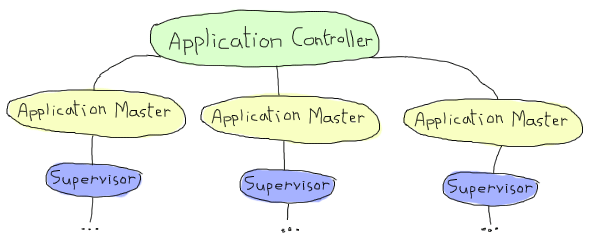
your app
http
server
logger

app@computer-1
Distributed Applications


app@computer-2

Fault Tolerance


Open Telecom Platform
-
Supervisor
-
Application
-
GenServer
-
GenEvent
OOP
Objects
Elixir
Processes


Production-ready?

CoAP
-
Constrained Application Protocol
kind of a "smaller HTTP, for IoT"


request
response
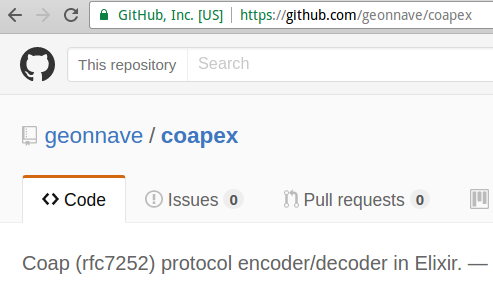
CoAP - Codes
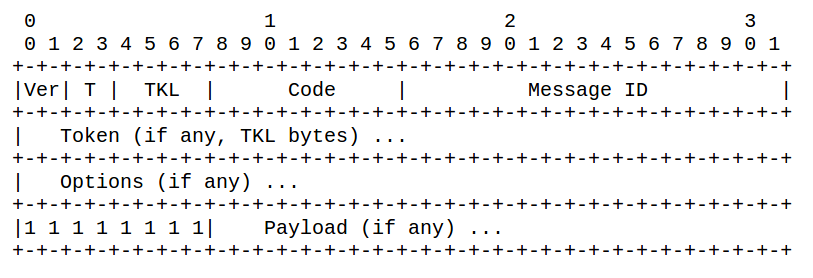
(binary header)
0.01 (GET) (Request)
0.02 (POST) (Request)
2.05 (Content) (Response)
4.04 (Not Found) (Response)
000.00001
000.00010
010.00101
100.00100
CoAP
parser

1
0
0
0.01
123
01000000 00000001 0000000001111011 11111111
255
64 1 0 123 255
(empty)
(empty)
(empty)
%Message(type: :con,
code: :get,
msg_id: 123,
options: [])int coap_parseHeader(coap_header_t *hdr,
const uint8_t *buf,
size_t buflen)
{
if (buflen < 4)
return COAP_ERR_HEADER_TOO_SHORT;
hdr->ver = (buf[0] & 0xC0) >> 6;
if (hdr->ver != 1)
return COAP_ERR_VERSION_NOT_1;
hdr->t = (buf[0] & 0x30) >> 4;
hdr->tkl = buf[0] & 0x0F;
hdr->code = buf[1];
hdr->id[0] = buf[2];
hdr->id[1] = buf[3];
return 0;
}https://github.com/1248/microcoap/blob/master/coap.c
C
def decode(<<1::2, type::2, token_len::4,
code_class::3, code_detail::5,
msg_id::16,
token::binary-size(token_len),
rest::binary>>) do


def decode(<<1::2, type::2, token_len::4,
code_class::3, code_detail::5,
msg_id::16,
token::binary-size(token_len),
rest::binary>>) do
code = decode_code(code_class, code_detail)
token = decode_token(token, token_len)
{options, payload} =
decode_options_and_payload(rest)
%Message{
version: 1,
type: Registry.from(:types, type),
code: code,
msg_id: msg_id, token: token,
options: options, payload: payload
}
endint coap_parseHeader(coap_header_t *hdr,
const uint8_t *buf,
size_t buflen)
{
if (buflen < 4)
return COAP_ERR_HEADER_TOO_SHORT;
hdr->ver = (buf[0] & 0xC0) >> 6;
if (hdr->ver != 1)
return COAP_ERR_VERSION_NOT_1;
hdr->t = (buf[0] & 0x30) >> 4;
hdr->tkl = buf[0] & 0x0F;
hdr->code = buf[1];
hdr->id[0] = buf[2];
hdr->id[1] = buf[3];
return 0;
}Hands on!

- Can read & parse its own Service Description
- Can Register itself in the Broker
- Has a REST API
- Enforces Access Control
- Has unit tests
- Can keep state
Goal:
Build a
Temperature Sensor
service that:
#1
Create a new project
$ mix new temperature_sensor --sup
$ cd temperature_sensor
$ mix test
$ iex -S mix#2
- put jsonld file at "priv" dir
def read_service_description do
Path.join("#{:code.priv_dir(:temperature_sensor)}",
"service_description.jsonld")
|> File.read!()
end$ mix test$ iex -S mix#3
# mix.exs
defp deps do
[{:poison, "~> 3.0"}]
enddef read_service_description do
Path.join("#{:code.priv_dir(:temperature_sensor)}",
"service_description.jsonld")
|> File.read!()
|> Poison.decode!()
end$ mix deps.get$ mix test#4
def register(sd) do
Task.start_link(fn ->
BrokerHTTPClient.register(sd)
end)
end# mix.exs
defp deps do
[
{:poison, "~> 3.0"},
{:broker_http_client,
git: "git@git.febrace.org.br:swarm-unit/broker-http-client-ex.git"}
]
end$ mix deps.get$ mix test#5
Plug.Adapters.Cowboy.child_spec(:http,
TemperatureSensor.Router,
[], [port: sd_port])# mix.exs
defp deps do
[
{:cowboy, "~> 1.0.0"},
{:plug, "~> 1.0"},
{:poison, "~> 3.0"},
{:broker_http_client,
git: "git@git.febrace.org.br:swarm-unit/broker-http-client-ex.git"}
]
end$ mix deps.get$ iex -S mix#6
defmodule RouterTest$ mix test#7
match _ do
Logger.warn "Invalid request at #{conn.request_path}"
send_resp(conn, 404, "EEEPA")
end$ mix test$ iex -S mix#8
plug BrokerHTTPClient, :authorize$ iex -S mix$ curl \
-H "x-m2m-origin: alice"
http://localhost:8001/temperature-sensor/value- Can read & parse its own Service Description
- Can Register itself in the Broker
- Has a REST API
- Enforces Access Control
- Has unit tests
- Can keep state
Goal:
Build a
Temperature Sensor
service that:






Obrigado
Gracias
Merci
Thanks
Appendix
:observer.start
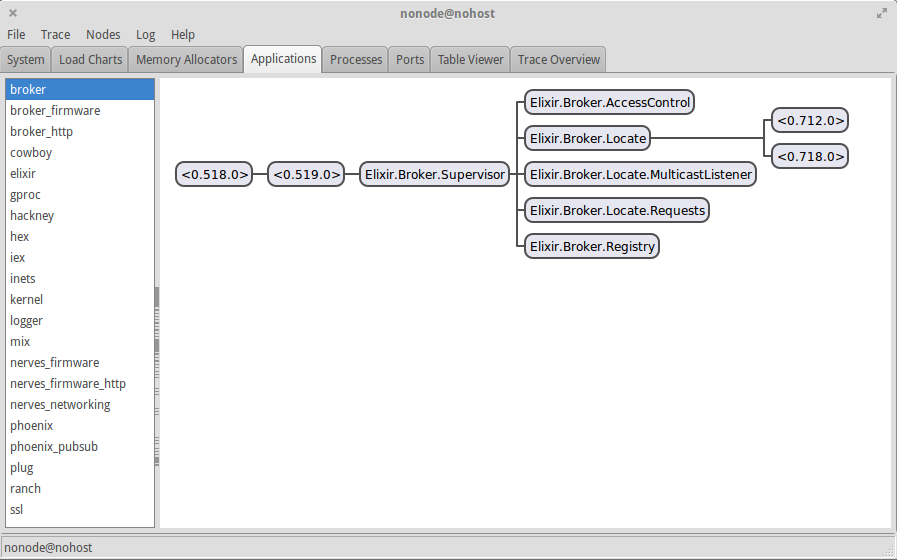
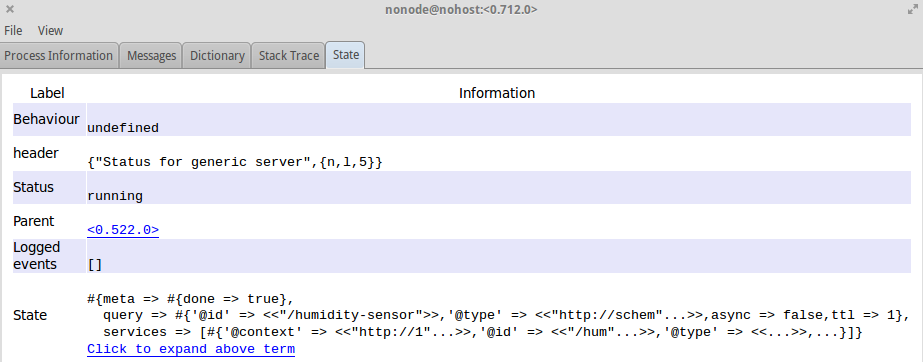
(slide intentionally left blank)
(this is the appendix!)
Por que o Elixir foi criado?
By Geovane Fedrecheski
Por que o Elixir foi criado?
- 556



